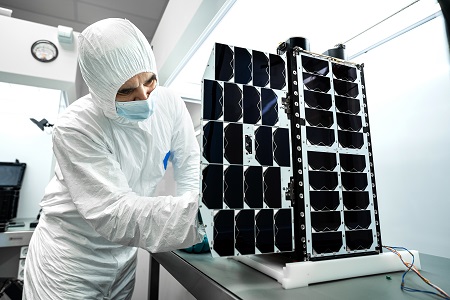 Absolut Sensing, a subsidiary of the Absolut Group specialised in the measurement of greenhouse gas emissions, has achieved a significant milestone with the selection of satellite manufacturer Kongsberg NanoAvionics (NanoAvionics) to build its demonstration satellite dubbed “GEN1”, after a rigorous selection process.
Absolut Sensing, a subsidiary of the Absolut Group specialised in the measurement of greenhouse gas emissions, has achieved a significant milestone with the selection of satellite manufacturer Kongsberg NanoAvionics (NanoAvionics) to build its demonstration satellite dubbed “GEN1”, after a rigorous selection process.
Under the mission agreement, NanoAvionics will provide its 16U nanosatellite bus, payload integration services, a satellite testing campaign, launch services, and satellite operations.
With the GESat constellation, Absolut Sensing looks to offer public and private organisations a way to monitor and decrease man-made greenhouse emissions. The first of a three-phases process, an initial constellation of 12 satellites dedicated to the precise measurement of methane (CH4) emissions, will be launched by 2025. This will be followed by the launch of six carbon dioxide (CO2) and six nitrous oxide (N2O) emissions-measuring satellites in 2026 and 2027, respectively.
They will complete the 24 satellites constellation set to be the local greenhouse gas measurement system, which, with the help of on-board cutting-edge artificial intelligence, will enable autonomous, near-real-time emission detection.
Commenting on the deal, Tristan Laurent, Absolut Sensing co-founder and CEO, said: “This demonstration satellite will allow us to validate our instrument measurement concept and the associated ground processing chain. NanoAvionics has cemented its reputation as a provider of reliable cubesat platforms and we look forward to working with them towards this first launch in early 2024.”
Vytenis J. Buzas, co-founder and CEO of NanoAvonics, said: “It is becoming increasingly clear that France is determined to become a significant player in the NewSpace industry. Absolut Sensing’s mission to track and measure greenhouse gas emissions from space is an excellent example of NewSpace innovation. I am proud that NanoAvionics, with its satellite technology, can support Absolut Sensing and a growing number of other French organisations in achieving their goals to provide valuable services from space.”
The selection of the micro-satellites’ constellation manufacturer and the launch provider has not yet been made.












Add Comment